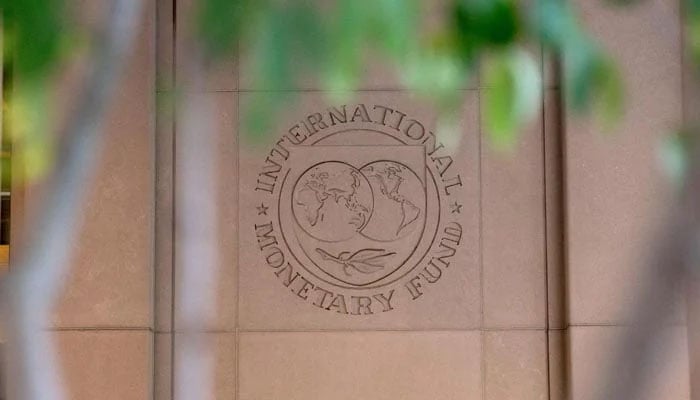IMF gives more tasks to unlock loan
Pakistan is now the only South Asian country that’s yet to secure a bailout from the multilateral lender
ISLAMABAD: The International Monetary Fund (IMF) Tuesday said Pakistan had a few more tasks to do before it unlocks a $6.5 billion loan programme to avoid default, putting pressure on the government to secure assurances from countries that have promised financing support, foreign media reported.
Pakistan is now the only South Asian country that’s yet to secure a bailout from the multilateral lender as Sri Lanka clinched financing this week and Bangladesh pushes on with carrying out IMF-mandated reforms.
“A staff-level agreement will follow once the few remaining points are closed,” said Esther Perez Ruiz, the IMF’s resident representative for Pakistan. “Ensuring there is sufficient financing to support the authorities in the implementation of their policy agenda is the paramount priority.”
Finance Minister Ishaq Dar said last week that the IMF wanted to see countries finalise commitments they’ve made to help Pakistan shore up its funds before signing off on the bailout package. Pakistan needs to repay about $3 billion of debt by June, while $4 billion is expected to be rolled over. Pakistan has taken tough measures, including increasing taxes and energy prices, and allowing its currency to weaken to restart a $6.5 billion IMF loan package. The funds will offer some relief to a nation still reeling from a dollar shortage that has raised the probability of the economy slipping into a recession ahead of elections this year.
Ruiz said the Washington-based lender wasn’t consulted on the government’s plan to raise fuel prices for wealthier motorists to finance a subsidy for lower-income people. “Fund staff are seeking details on the scheme in terms of its operation, cost, targeting, protections against fraud and abuse, and offsetting measures, and will carefully discuss these elements with the authorities,” she said.
This is not the first time petrol price subsidies have become a sticking point for IMF. The previous government, led by former premier Imran Khan, had given petrol subsidies, which stalled the IMF programme last year.
Pakistan’s benchmark KSE-100 Index fell 0.4 percent, down for the fourth straight session. The rupee fell 0.8 percent to close at 284.03 a dollar, near its record low on March 20 as investors are concerned over the continued delays in resuming the IMF programme.
The nation has failed to meet multiple deadlines in the past to secure a deal for a loan that was scheduled to be released in November.
The government should have taken the IMF into confidence before announcing such a scheme, said Tahir Abbas, head of research at Karachi-based Arif Habib Ltd., from Karachi. “The fuel subsidy could further delay the much-awaited resumption of the loan programme.”
Amid a substantial decline of over 39 percent in materialising foreign loans from multilateral and bilateral creditors, the government is making last-ditch efforts, including using the influence of the US diplomatic corps, for reviving the stalled IMF programme.
However, the timing of the proposed cross-fuel subsidy for motorbikes and vehicles under 800cc has literally shocked Pakistan’s negotiating team engaged in holding virtual parleys with the Fund staff.
Instead of waiting for a few more days for striking a staff-level agreement with the IMF, the government preferred to move for political expediency despite the Ministry of Finance’s internal warnings that the sharing of modalities with the Fund staff might cause further delay in reviving the IMF programme.
In the absence of revival of the IMF programme, Pakistan has already witnessed a major brunt in the shape of a dollar liquidity crunch and the country could hardly fetch inflows in the shape of foreign loans to the tune of just $7.4 billion to first eight months (July-Feb) period of the current fiscal year against $12.17 billion in the same period of the last financial year. The country’s ability to secure foreign loans has shrunk significantly as it witnessed a drop of 39.17 percent in the first eight months of the current fiscal year compared to the same period of the last financial year.
-
 Inside Channing Tatum's Red Carpet Return After Shoulder Surgery
Inside Channing Tatum's Red Carpet Return After Shoulder Surgery -
 Ryan Coogler Brands 'When Harry Met Sally' His Most Favourite Rom Com While Discussing Love For Verstality
Ryan Coogler Brands 'When Harry Met Sally' His Most Favourite Rom Com While Discussing Love For Verstality -
 Sarah Pidgeon Explains Key To Portraying Carolyn Bessette Kennedy
Sarah Pidgeon Explains Key To Portraying Carolyn Bessette Kennedy -
 Justin Bieber Rocked The World With Bold Move 15 Years Ago
Justin Bieber Rocked The World With Bold Move 15 Years Ago -
 Sam Levinson Wins Hearts With Huge Donation To Eric Dane GoFundMe
Sam Levinson Wins Hearts With Huge Donation To Eric Dane GoFundMe -
 Kate Middleton Steps Out First Time Since Andrew Mountbatten-Windsor's Arrest
Kate Middleton Steps Out First Time Since Andrew Mountbatten-Windsor's Arrest -
 Inside Nicole 'Snooki' Polizzi's 'private' Marriage With Husband Jionni LaValle Amid Health Scare
Inside Nicole 'Snooki' Polizzi's 'private' Marriage With Husband Jionni LaValle Amid Health Scare -
 Germany’s Ruling Coalition Backs Social Media Ban For Children Under 14
Germany’s Ruling Coalition Backs Social Media Ban For Children Under 14 -
 Meghan Markle Shuts Down Harry’s Hopes Of Reconnecting With ‘disgraced’ Uncle
Meghan Markle Shuts Down Harry’s Hopes Of Reconnecting With ‘disgraced’ Uncle -
 Liza Minnelli Alleges She Was Ordered To Use Wheelchair At 2022 Academy Awards
Liza Minnelli Alleges She Was Ordered To Use Wheelchair At 2022 Academy Awards -
 Quinton Aaron Reveals Why He Does Not Want To Speak To Wife Margarita Ever Again
Quinton Aaron Reveals Why He Does Not Want To Speak To Wife Margarita Ever Again -
 Prince William And Kate's Photos With Andrew Used In New Campaign Against Royals
Prince William And Kate's Photos With Andrew Used In New Campaign Against Royals -
 Touching Eric Dane Moment With Daughter Emerges After Viral Final Words
Touching Eric Dane Moment With Daughter Emerges After Viral Final Words -
 Kate Middleton Quietly Backs Princess Beatrice, Eugenie As Andrew Scandal Intensifies
Kate Middleton Quietly Backs Princess Beatrice, Eugenie As Andrew Scandal Intensifies -
 Michael B. Jordan Shares His Thoughts On Growing Trend Of Live-action Anime Adaptations
Michael B. Jordan Shares His Thoughts On Growing Trend Of Live-action Anime Adaptations -
 Why Mikaela Shiffrin Celebrated Olympic Gold With Taylor Swift Song?
Why Mikaela Shiffrin Celebrated Olympic Gold With Taylor Swift Song?




